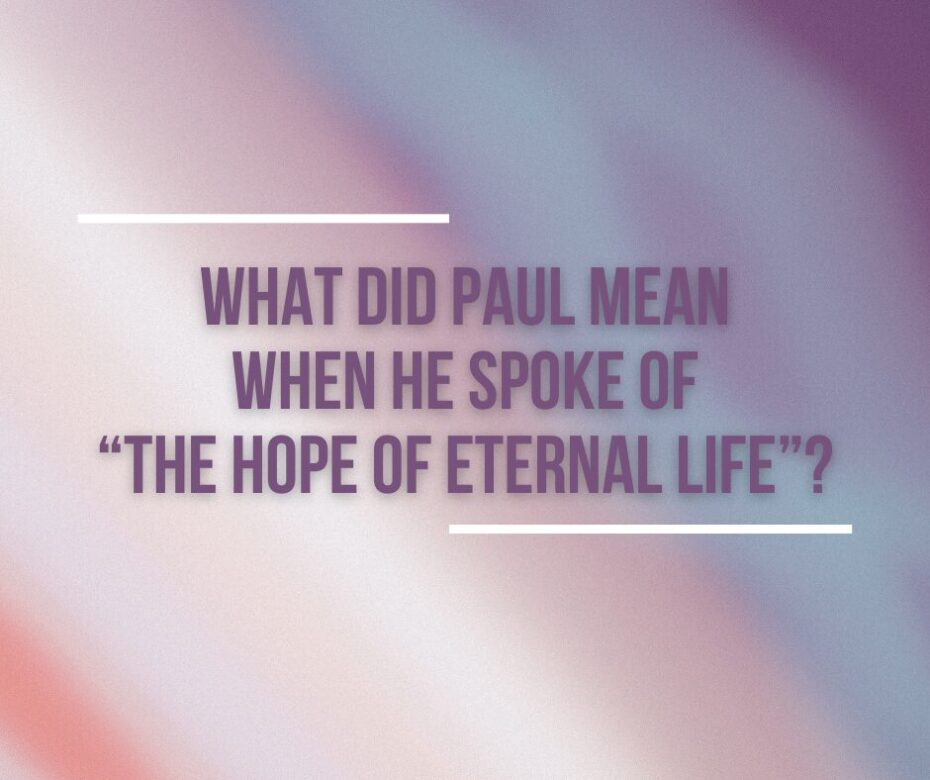“Paul…in hope of eternal life which God, who cannot lie, promised before time began, but has in due time manifested His word through preaching, which was committed to me according to the commandment of God our Savior” (Titus 1:1-3).
“…that having been justified by His grace we should become heirs according to the hope of eternal life” (Titus 3:7).
What did Paul mean when he spoke of “the hope of eternal life”? This expression occurs in only these two places in the Bible.
There is, however, a related expression: “the hope of salvation.” It is found in 1 Thess 5:8.
This blog will address the hope of eternal life. I’ll deal with the hope of salvation in a second blog.
Without explanation, the hope of eternal life confuses people because in English the word hope refers to a desire, not a certainty. Therefore, many think that Paul is saying that we desire eternal life but do not know whether we have it.
In Greek, the word hope (elpis) sometimes refers to a desire. Paul said, “I hope to send him [Timothy] at once” (Phil 2:23) and “I hope to come to you shortly” (1 Tim 3:14). However, that is not the most common meaning of elpis.
In the NT, hope (elpis) often means something that is certain, but for which the time of the fulfillment is unknown. Christ is “the hope of glory” (Col 1:27). We will be glorified one day. But the timing of the Rapture is unknown.
“The Lord Jesus Christ [is] our hope” (1 Tim 1:1). That is, we know He is coming back and establishing His kingdom. But we do not know when.
We are “looking for the blessed hope and glorious appearing of our great God and Savior Jesus Christ” (Titus 2:13). Knight comments: “Paul often uses the concept of ‘hope’ of the expectancy that Christians have for the unseen and sure, but not yet realized, spiritual blessings that they will possess in the future in Christ” (The Pastoral Epistles, p. 321, emphasis added). Here the “blessed hope” and “glorious appearing” are the same. Our certain expectation is that Christ will soon return in glory (Matt 16:27).
I comment on Titus 3:7 in The Grace New Testament Commentary:
The aim of this renewing work of the Spirit is heirship, ruling with Christ in the life to come. Such is possible because of the hope, the certain yet still future truth, of eternal life, that is, eternal life in glorified bodies in a righteous kingdom. While believers have eternal life as a present possession, in another sense, it is yet future. By means of this abundant supply of the Spirit, believers have all they need to become co-heirs with Christ in the life to come (cf. Rom 8:17; 2 Pet 1:3) (“Titus,” p. 1021).
We already have everlasting life (John 3:16; 6:47; Eph 2:5). However, everlasting life has the potential for great abundance (John 10:10). All believers will have a much fuller experience of eternal life when glorified. Those who rule with Christ will have a superlative experience of that life.
When I was on staff with CCC, we used to say regarding 1 John 5:13, “We have a know-so faith, not a hope-so faith.” That is true in terms of our assurance of eternal destiny. But there is a sense in which we do have a hope-so faith. We do not know when Christ will return and give us glorified bodies. That certain knowledge that He will glorify us soon should motivate us to fight the good fight so that we might be chosen to rule with Him (2 Tim 4:6-8).
Onthreee.i
__________
i Did you get that Rebus puzzle? Look at it again. There is a word within a word. Have you seen it yet? Here is the answer: Onthreee = three in one = the Trinity. God is three Persons, but one Being. I think that is difficult, if not impossible, for our finite minds to grasp. But it is true. And it should cause us to praise God.


